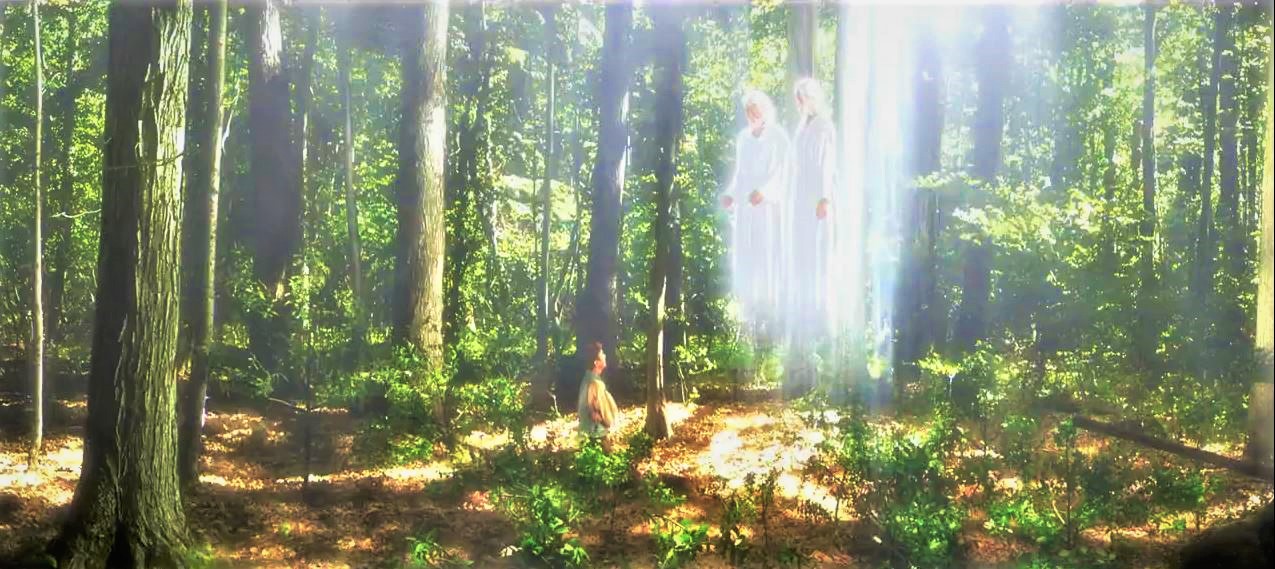A COMPOSITE ACCOUNT OF JOSEPH SMITH’S FIRST VISION
Introduction
To members of The Church of Jesus Christ of Latter-day Saints, the greatest event since the resurrection of Jesus Christ was the appearance of God the Father and His Son to the Prophet Joseph Smith. The event occurred “on the morning of a beautiful, clear day, early in the spring of eighteen hundred and twenty.” Research by John C. Lefgren and John P. Pratt strongly suggests Sunday, March 26th, as the exact date. (https://www.johnpratt.com/items/docs/lds/meridian/2002/vision.html.)
Faced with persecution when he began to tell others of his vision, the young prophet became careful about sharing details of his sacred experience. For twenty years there was no published version. Finally, in 1842, the Church published the account Joseph Smith had written in 1838. It is currently found in The Pearl of Great Price as Joseph Smith—History and is by far the best known version of his vision.
However, through the years Joseph Smith did share written and oral accounts of his experience on various occasions, and several of his listeners recorded their memory of what he told them. Some critics have complained that the several versions are not identical. But carefully rehearsed identical accounts could easily be the mark of an imposter. One telling the truth, on the other hand, could reasonably be expected to tailor his several narratives to emphasize those points he felt most relevant to each audience. Rather than contradict each other, the various accounts add fascinating details. The sum of them all is greater than the contributions of any one of them alone.
The following is an attempt to blend significant details from eight of these accounts into a coherent whole. That which appears in regular type is from the familiar Pearl of Great Price account. Italics denote text inserted from other sources. See detailed references at the end. Readers will also want to see the following video prepared for the Church History museum in Salt Lake City, which also draws upon several of the printed accounts.
Composite Account of the First Vision
At about the age of twelve years my mind became seriously impressed with regard to the all-important concerns for the welfare of my immortal soul, which led me to searching the scriptures, believing, as I was taught, that they contained the word of God. Thus applying myself to them and my intimate acquaintance with those of different denominations led me to marvel exceedingly, for I discovered that they did not adorn their profession by a holy walk and a godly conversation agreeable to what I found contained in that sacred depository. This was a grief to my soul. Thus, from the age of twelve years to fifteen I pondered many things in my heart concerning the situation of the world of mankind–the contentions and divisions, the wickedness and abominations, and the darkness which pervaded the minds of mankind. My mind became exceedingly distressed, for I became convicted of my sins, and by searching the scriptures I found that mankind did not come unto the Lord but that they had apostatized from the true and living faith, and there was no society or denomination that built upon the gospel of Jesus Christ as recorded in the New Testament, and I felt to mourn for my own sins and for the sins of the world, for I learned in the scriptures that God was the same yesterday, today, and forever–that he was no respecter to persons, for he was God. (1832)
Sometime in the second year after our removal to Manchester, there was in the place where we lived an unusual excitement on the subject of religion. It commenced with the Methodists, but soon became general among all the sects in that region of country. Indeed, the whole district of country seemed affected by it, and great multitudes united themselves to the different religious parties, which created no small stir and division amongst the people, some crying “Lo, here!” and others, “Lo, there!” Some were contending for the Methodist faith, some for the Presbyterian, and some for the Baptist.
For, notwithstanding the great love which the converts to the different faiths expressed at the time of their conversion, and the great zeal manifested by the respective clergy, who were active in getting up and promoting this extraordinary scene of religious feeling, in order to have everybody converted, as they were pleased to call it; yet when the converts began to file off, some to one party and some to another, it was seen that the seemingly good feelings of both the priests and the converts were more pretended than real; for a scene of great confusion and bad feeling ensued‑‑priest contending against priest, and convert against convert; so that all their good feelings one for another, if they ever had any, were entirely lost in a strife of words and a contest about opinions.
I was at this time in my fifteenth year. My father’s family were proselyted to the Presbyterian faith, and four of them joined that church, namely, my mother, Lucy; my brothers Hyrum and Samuel Harrison; and my sister Sophronia.
During
this time of great excitement my mind was called up to serious reflection and
great uneasiness; but though my feelings were deep and often poignant, still I
kept aloof from all these parties, though I attended their several meetings as
often as occasion would permit. In process of time my mind became somewhat
partial to the Methodist sect, and I felt some desire to be united with them;
but so great were the confusion and strife among the different denominations,
that it was impossible for a person young as I was, and so unacquainted with
men and things, to come to any certain conclusion who was right and who was
wrong.
When about fourteen years of age I began to reflect upon the importance of being prepared for a future state, and upon enquiring the plan of salvation I found that there was a great clash in religious sentiment; if I went to one society they referred me to one plan, and another to another; each one pointing to his own particular creed as the summum bonum of perfection: considering that all could not be right, and that God could not be the author of so much confusion, I determined to investigate the subject more fully, believing that if God had a church it would not be split up into factions, and that if he taught one society to worship one way, and administer in one set of ordinances, he would not teach another principles which were diametrically opposed. (1842)
My mind at times was greatly excited, the cry and tumult were so great and incessant. The Presbyterians were most decided against the Baptists and Methodists, and used all the powers of both reason and sophistry to prove their errors, or, at least, to make the people think they were in error. On the other hand, the Baptists and Methodists in their turn were equally zealous in endeavoring to establish their own tenets and disprove all others.
In the midst of this war of words and tumult of opinions, I often said to myself: What is to be done? Who of all these parties are right; or, are they all wrong together? If any one of them be right, which is it, and how shall I know it?
Br. Joseph told us the first call he had a revival meeting, his mother, brothers and sisters got religion. He wanted to get religion too, wanted to feel and shout like the rest but could feel nothing, opened his Bible of the first passage that struck him was if any man lack wisdom let him ask of God who giveth to all men liberally and upbraideth not. (Alexander Neibaur account.)
While I was laboring under the extreme difficulties caused by the contests of these parties of religionists, I was one day reading the Epistle of James, first chapter and fifth verse, which reads: If any of you lack wisdom, let him ask of God, that giveth to all men liberally, and upbraideth not; and it shall be given him.
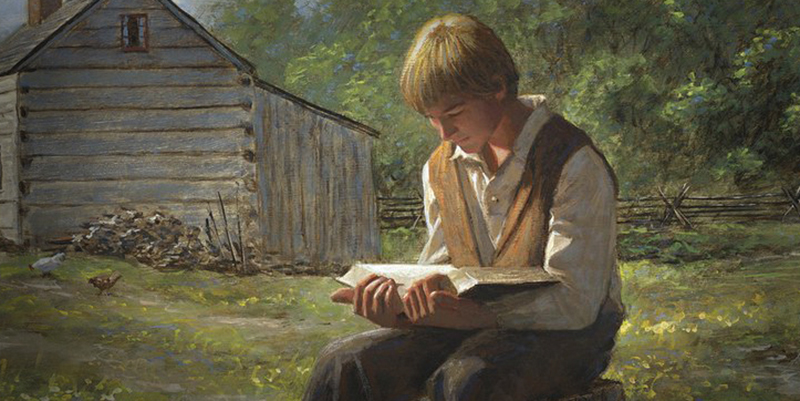
Never did any passage of scripture come with more power to the heart of man than this did at this time to mine. It seemed to enter with great force into every feeling of my heart. I reflected on it again and again, knowing that if any person needed wisdom from God, I did; for how to act I did not know, and unless I could get more wisdom than I then had, I would never know; for the teachers of religion of the different sects understood the same passages of scripture so differently as to destroy all confidence in settling the question by an appeal to the Bible.
The Lord does reveal himself to me. I know it. He revealed himself to me first when I was about fourteen years old, a mere boy. I will tell you about it. There was a reformation among the different religious denominations in the neighborhood where I lived, and I became serious, and was desirous to know what Church to join. While thinking of this matter, I opened the Testament promiscuously on these words, in James, “Ask of the Lord who giveth to all men liberally and upbraideth not.” I just determined I’d ask him. I immediately went out into the woods where my father had a clearing, and went to the stump where I had stuck my axe when I had quit work, and I kneeled down, and prayed, saying, “O Lord, what Church shall I join?” (David Nye White account)
Being thus perplexed in mind, I retired to the silent grove and there bowed down before the Lord, under a realizing sense (if the Bible be true) ask and you shall receive, knock and it shall be opened, seek and you shall find, and again, if any man lack wisdom, let of God [sic] who giveth to all men liberally & upbraideth not. (1835)
So, in
accordance with this, my determination to ask of God, I retired to the woods to
make the attempt. It was on the morning of a beautiful, clear day, early in the
spring of eighteen hundred and twenty. It was the first time in my life that I
had made such an attempt, for amidst all my anxieties I had never as yet made
the attempt to pray vocally.
After I had retired to the place where I had previously designed to go, having looked around me, and finding myself alone, I kneeled down and began to offer up the desires of my heart to God.
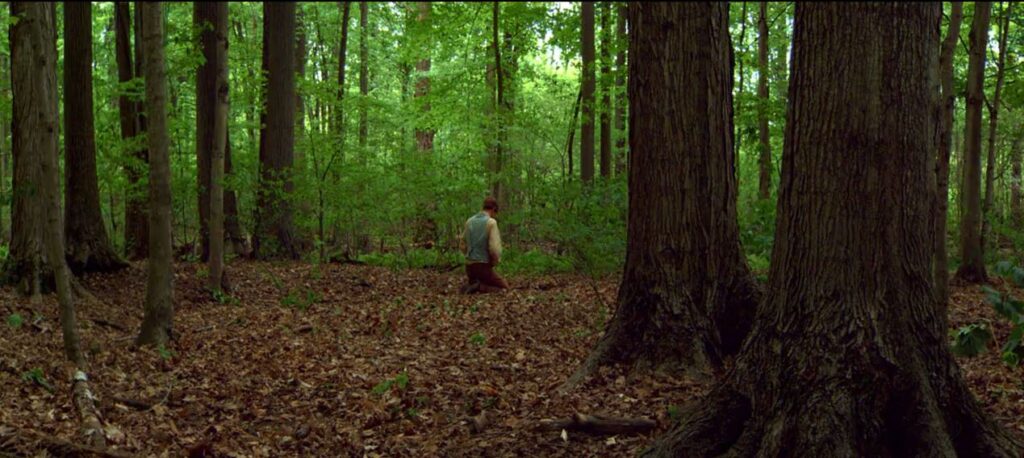
I had scarcely done so, when immediately I was seized upon by some power which entirely overcame me, and had such an astonishing influence over me as to bind my tongue so that I could not speak. Thick darkness gathered around me, and it seemed to me for a time as if I were doomed to sudden destruction.
I made a fruitless attempt to pray. My tongue seemed to be swollen in my mouth, so that I could not utter. I heard a noise behind me like some one walking towards me. I strove again to pray, but could not; the noise of walking seemed to draw nearer. I sprang upon my feet and looked round, but saw no person or thing that was calculated to produce the noise of walking. I kneeled again, my mouth was opened and my tongue loosed; I called on the Lord in mighty prayer. (1835)
The adversary then made several strenuous efforts to cool his ardent soul. He filled his mind with doubts and brought to mind all manner of inappropriate images to prevent him from obtaining the object of his endeavors; but the overflowing mercy of God came to buoy him up and gave new impetus to his failing strength. However, the dark cloud soon parted and light and peace filled his frightened heart. Once again he called upon the Lord with faith and fervency of spirit. (Orson Hyde account)
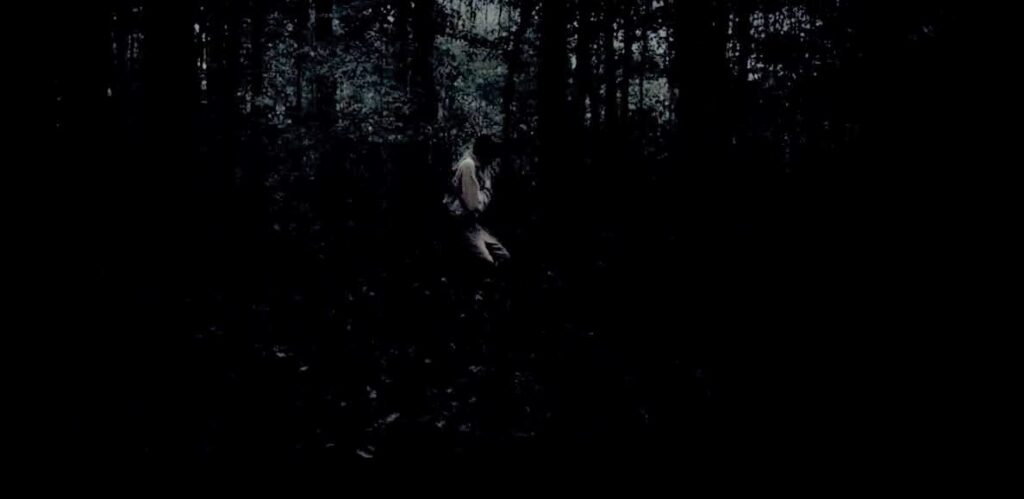
But, exerting all my powers to call upon God to deliver me out of the power of this enemy which had seized upon me, and at the very moment when I was ready to sink into despair and abandon myself to destruction‑‑not to some imaginary ruin, but to the power of some actual being from the unseen world, who had such marvelous power as I had never before felt in any being‑‑just at this moment of great alarm, I saw a pillar of light exactly over my head, above the brightness of the sun, which descended gradually until it fell upon me.
It no sooner appeared than I found myself delivered from the enemy which held me bound. When the light rested upon me I saw two Personages, whose brightness and glory defy all description, standing above me in the air. One of them spake unto me, calling me by name and said, pointing to the other‑‑This is My Beloved Son. Hear Him!
I cried unto the Lord for mercy, for there was none else to whom I could go and obtain mercy, and the Lord heard my cry in the wilderness, and while in the attitude of calling upon the Lord … a pillar of light above the brightness of the sun at noon day came down from above and rested upon me, and I was filled with the Spirit of God, and the Lord opened the heavens upon me and I saw the Lord, and he spake unto me saying, “Joseph, my son, thy sins are forgiven thee. Go thy way, walk in my statutes, and keep my commandments. Behold, I am the Lord of glory. I was crucified for the world that all those who believe on my name may have eternal life. Behold, the world lieth in sin at this time and none doeth good, no not one. They have turned aside from the gospel and keep not my commandments. They draw near to me with their lips while their hearts are far from me, and mine anger is kindling against the inhabitants of the earth to visit them according to this ungodliness and to bring to pass that which hath been spoken by the mouth of the prophets and apostles. Behold and lo, I come quickly, as it is written of me, in the cloud clothed in the glory of my Father.” And my soul was filled with love and for many days I could rejoice with great joy, and the Lord was with me, but could find none that would believe the heavenly vision. (1832)
A pillar of fire appeared above my head, which presently rested down upon me, and filled me with unspeakable joy. A personage appeared in the midst of this pillar of flame, which was spread all around and yet nothing consumed. Another personage soon appeared like unto the first: he said unto me “thy sins are forgiven thee.” He testified also unto me that Jesus Christ is the son of God. I saw many angels in this vision. (1835)
While
fervently engaged in supplication my mind was taken away from the objects with
which I was surrounded, and I was enwrapped in a heavenly vision and saw two
glorious personages who exactly resembled each other in features, and likeness,
surrounded with a brilliant light which eclipsed the sun at noon-day. They told me that all religious denominations
were believing in incorrect doctrines, and that none of them was acknowledged
of God as his church and kingdom. And I
was expressly commanded to “go not after them,” at the same time
receiving a promise that the fulness of the gospel should at some future time
be make known unto me. (1842)
Directly I saw a light, and then a glorious personage in the light, and then another personage, and the first personage said to the second, Behold my beloved Son, hear him.–I then addressed this second person, saying, O Lord, what church shall I join? He replied, “don’t join any of them, they are all corrupt.” The vision then vanished, and when I came to myself, I was sprawling on my back and it was some time before my strength returned. (David Nye White account.)
At this sacred moment, the natural world around him was excluded from his view, so that he would be open to the presentation of heavenly and spiritual things. Two glorious heavenly personages stood before him, resembling each other exactly in features and stature. They told him that his prayers had been answered and that the Lord had decided to grant him a special blessing. He was also told that he should not join any of the religious sects or denominations, because all of them erred in doctrine and none was recognized by God as his church and kingdom. He was further commanded, to wait patiently until some future time, when the true doctrine of Christ and the complete truth of the gospel would be revealed to him. The vision closed and peace and calm filled his mind. (Orson Hyde account)
Saw a fire toward heaven came near and nearer; saw a personage in the fire, light complexion, blue eyes, a piece of white cloth drawn over his shoulders, his right arm bare. After a while another person came to the side of the first. Mr. Smith then asked, must I join the Methodist Church? No, they are not my people, have gone astray. There is none that doeth good, not one, but this is my beloved Son–hearken ye him. (Alexander Neibaur’s account.)
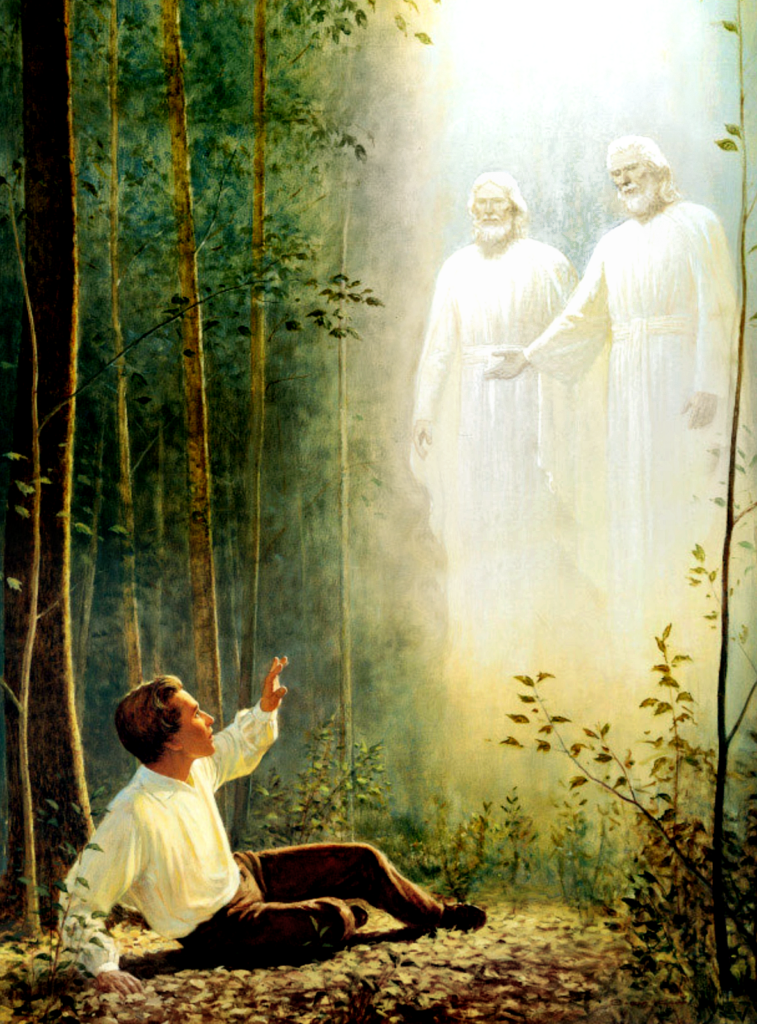
And while thus pouring out his soul, anxiously desiring an answer from God, he at length saw a very bright and glorious light in the heavens above, which at first seemed to be a considerable distance. He continued praying, while the light appeared to be gradually descending towards him; and as it drew nearer, it increased in brightness and magnitude, so that by the time that it reached the tops of the trees, the whole wilderness for some distance around was illuminated in a most glorious and brilliant manner. He expected to have seen the leaves and boughs of the trees consumed, as soon as the light came in contact with them. But perceiving that it did not produce that effect, he was encouraged with the hope of being able to endure its presence. It continued descending slowly, until it rested upon the earth, and he was enveloped in the midst of it. When it first came upon him, it produced a peculiar sensation throughout his whole system; and immediately, his mind was caught away from the natural objects with which he was surrounded, and he was enwrapped in a heavenly vision, and saw two glorious personages, who exactly resembled each other in their features or likeness. He was informed, that his sins were forgiven. He was also informed upon the subjects, which had for some time previously agitated his mind, viz.—that all the religious denominations were believing in incorrect doctrines; and, consequently, that none of them was acknowledged of God, as his church and kingdom. And he was expressly commanded, to go not after them; and he received a promise that the true doctrine—the fulness of the gospel, should, at some future time, be made known to him. (Orson Pratt’s account.)
My object in going to inquire of the Lord was to know which of all the sects was right, that I might know which to join. No sooner, therefore, did I get possession of myself, so as to be able to speak, than I asked the Personages who stood above me in the light, which of all the sects was right (for at this time it had never entered into my heart that all were wrong)‑‑and which I should join.
I was answered that I must join none of them, for they were all wrong; and the Personage who addressed me said that all their creeds were an abomination in his sight; that those professors were all corrupt; that: “they draw near to me with their lips, but their hearts are far from me, they teach for doctrines the commandments of men, having a form of godliness, but they deny the power thereof.
He again forbade me to join with any of them; and many other things did he say unto me, which I cannot write at this time. When I came to myself again, I found myself lying on my back, looking up into heaven.
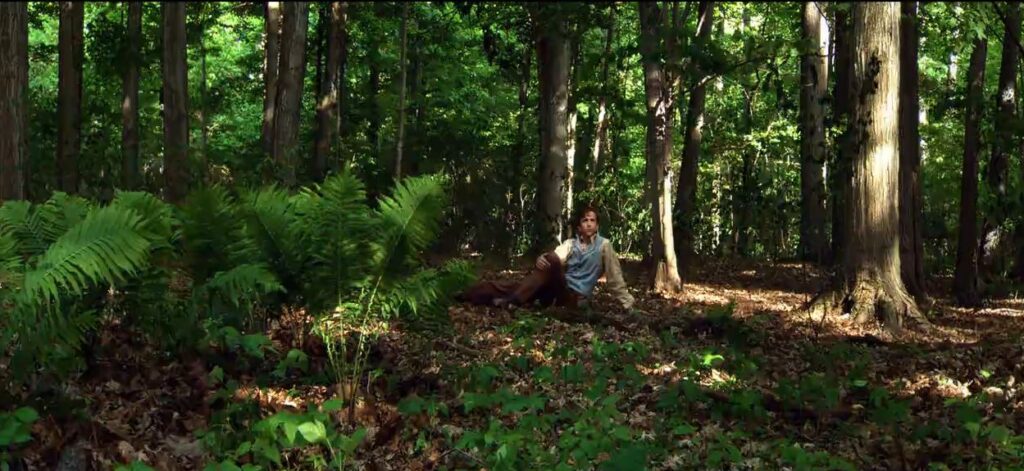
When the light had departed, I had no strength; but soon recovering in some degree, I went home. And as I leaned up to the fireplace, mother inquired what the matter was. I replied, “Never mind, all is well‑‑I am well enough off.” I then said to my mother, “I have learned for myself that Presbyterianism is not true.” It seems as though the adversary was aware, at a very early period of my life, that I was destined to prove a disturber and an annoyer of his kingdom; else why should the powers of darkness combine against me? Why the opposition and persecution that arose against me, almost in my infancy?
Some few days after I had this vision, I happened to be in company with one of the Methodist preachers, who was very active in the before mentioned religious excitement; and, conversing with him on the subject of religion, I took occasion to give him an account of the vision which I had had. I was greatly surprised at his behavior; he treated my communication not only lightly, but with great contempt, saying it was all of the devil, that there were no such things as visions or revelations in these days; that all such things had ceased with the apostles, and that there would never be any more of them.
I soon
found, however, that my telling the story had excited a great deal of prejudice
against me among professors of religion, and was the cause of great
persecution, which continued to increase; and though I was an obscure boy, only
between fourteen and fifteen years of age, and my circumstances in life such as
to make a boy of no consequence in the world, yet men of high standing would
take notice sufficient to excite the public mind against me, and create a
bitter persecution; and this was common among all the sects‑‑all united to
persecute me.
It caused me serious reflection then, and often has since, how very strange it was that an obscure boy, of a little over fourteen years of age, and one, too, who was doomed to the necessity of obtaining a scanty maintenance by his daily labor, should be thought a character of sufficient importance to attract the attention of the great ones of the most popular sects of the day, and in a manner to create in them a spirit of the most bitter persecution and reviling. But strange or not, so it was, and it was often the cause of great sorrow to myself.
However, it was nevertheless a fact that I had beheld a vision. I have thought since, that I felt much like Paul, when he made his defense before King Agrippa, and related the account of the vision he had when he saw a light, and heard a voice; but still there were but few who believed him; some said he was dishonest, others said he was mad; and he was ridiculed and reviled. But all this did not destroy the reality of his vision. He had seen a vision, he knew he had, and all the persecution under heaven could not make it otherwise; and though they should persecute him unto death, yet he knew, and would know to his latest breath, that he had both seen a light and heard a voice speaking unto him, and all the world could not make him think or believe otherwise.
So it was with me. I had actually seen a light, and in the midst of that light I saw two Personages, and they did in reality speak to me; and though I was hated and persecuted for saying that I had seen a vision, yet it was true; and while they were persecuting me, reviling me, and speaking all manner of evil against me for so saying, I was led to say in my heart: Why persecute me for telling the truth? For I had seen a vision; I knew it, and I knew that God knew it, and I could not deny it, neither dared I do it; at least I knew that by so doing I would offend God, and come under condemnation.
When I went home and told the people that I had a revelation, and that all the churches were corrupt, they persecuted me, and they have persecuted me ever since. They thought to put me down, but they haven’t succeeded, and they can’t do it. When I have proved that I am right, and get all the world subdued under me, I think I shall deserve something. (David Nye White account)
Nevertheless, I fell into transgression and sinned in many things, which brought wound upon my soul, and there were many things which transpired that cannot be written, and my father’s family have suffered many persecutions and afflictions. (1832)
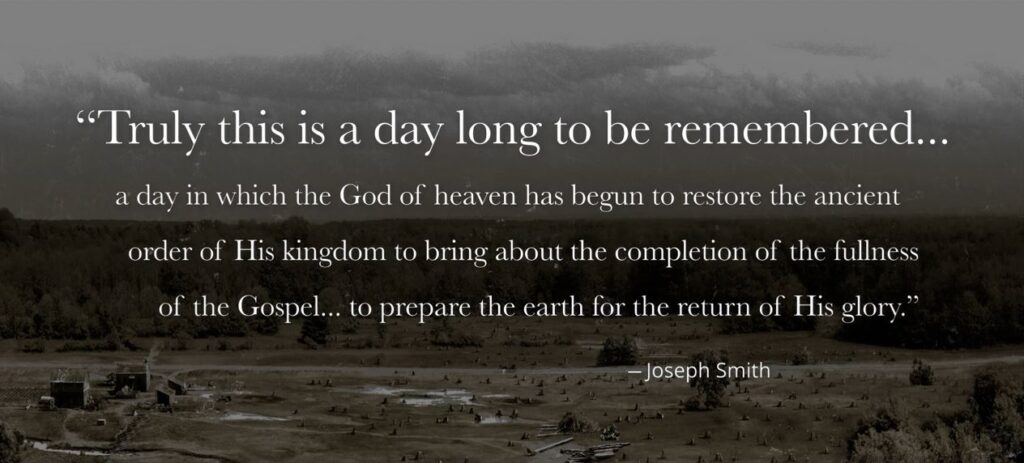
References:
1832 Account. The earliest known account of the First Vision, the only account written in Joseph Smith’s own hand, is found in a short, unpublished autobiography Joseph Smith produced in the second half of 1832.
1835 Account. In the fall of 1835, Joseph Smith recounted his First Vision to Robert Matthews, a visitor to Kirtland, Ohio. The retelling was recorded in Joseph’s journal by his scribe Warren Parrish.
1838 Account. The narration of the First Vision best known to Latter-day Saints today is the 1838 account, which is printed in the Pearl of Great Price as Joseph Smith—History. It was first published in 1842 in the Church’s newspaper, The Times and Seasons.
1842 Account. Written in response to Chicago Democrat editor John Wentworth’s request for information about the Latter-day Saints, this account was printed in the Times and Seasons in 1842.
Orson Pratt Account. This is the earliest published account of Joseph Smith’s first vision of Deity. It was written by Orson Pratt of the Quorum of the Twelve Apostles and published as a pamphlet in Scotland in 1840.
Orson Hyde Account. Another member of the Quorum of the Twelve, Orson Hyde, published this account of Joseph Smith’s earliest visions in Frankfurt, Germany, in 1842.
Alexander Neibaur Account. On 24 May 1844, German immigrant and church member Alexander Neibaur visited Joseph Smith in his home and heard him relate the circumstances of his earliest visionary experience.
David Nye White Account. In August 1843, David Nye White, editor of the Pittsburgh Weekly Gazette, interviewed Joseph Smith in his home as part of a two-day stop in Nauvoo, Illinois. His news article included an account of Joseph Smith’s first vision.
